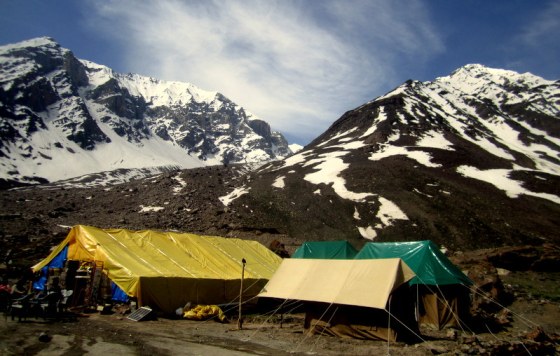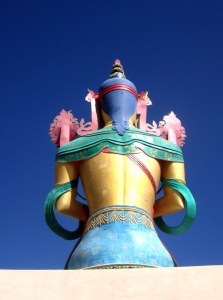by Yashasvini Rajeshwar

When I set off from Chennai to intern in Ladakh in early June, I did not know where I was going, how exactly I would get there or even the details of what I was going to do. It was away from the Chennai heat, it allowed me to work with young children in schools and it checked one off the bucket list – visiting the state of Jammu and Kashmir. That was the agenda for the summer.


Setting up libraries in government schools was the agenda that sent us gallivanting across the country. Fixing the shelves, sorting the books, training the teachers and perhaps most interestingly, interacting with the kids, was the broad schedule that accompanied us as we went school-hopping, visiting village after village in our attempt to make the most impact with the time at hand. We stayed at people’s houses, medical centres, library rooms, with complete strangers – just about anyone who had a roof over their heads and a corner to spare. We ate dal, chaval and spinach, spiceless and saltless, cooked as if it were all barley, and craved for the spices from back home. We resorted to lugging around pickle with us, dousing every meal, every snack with the welcoming flavours of green chilly. We drank whatever water was given to us, filling our bottles at roadside streams whenever we ran short of something to drink. We walked up to rivers and sat on their banks till we could no longer feel our toes, the sound of gushing water forever our companion across the long journey.

At the schools, we met children, avid first generation learners who were kids of shepherds and masons, labourers and teachers. They walked to school, sometimes climbing rocky slopes, to receive a public education that they were lucky enough to access. They wanted to become scientists and pilots, astronauts and librarians. They wanted to learn, to speak English, to read. They wanted to travel, to Delhi and Leh, to Chandigarh and Dehradun. They loved cinema and cricket. Their favourite TV show was Dance India Dance. They were like children anywhere else in the country.
Working at altitudes ranging between 10,000 and 13,000 feet takes some getting used to. Unless you are a mountain goat (or close), climbing stairs can make one breathless and sitting still can tire you out. Yet, walk into a classroom with smiling faces and voices that chime “Thank you, Ma’am!” for returning their chorused “Good morning!” and you can’t help but grab a book, grin back and plunge right into a story.
There is much to say about the education system (they work only from 10 AM to 3:30 PM with lunch break stretching for an hour), the flexibility of the schedules (holidays for Buddhist monks and volleyball tournaments happen a couple of times a week) and the quality of the Mid-day Meal Scheme (effective but a culinary disaster). There is much to say about the locals (blindly trusting and redefining generous) and the Tibetan refugees (inexplicably grateful to every Indian and extremely talented with beads and stones). No narrative can forget the mountains, bare rock staring down at you from every fathomable direction daring you to misbehave. And the mountains are nothing without the rivers – the Indus, the birthplace of our very civilization flowing past you at a languid, leisurely pace and its tributary Zanskar with its inviting opportunities to go white water rafting. There is much to say about Ladakh itself, geographically occupying the majority of Jammu and Kashmir and yet, not even figuring in the name of the state. Speaking a different language, largely following a different religion and physically so removed from the rest of the world, the only binding factor between a local Ladakhi and the rest of the country would be the shared citizenship and potentially a sense of patriotic pride.

My internship at Ladakh was officially with a Gurgaon-based organization called 17000 feet Foundation. Yet, in reality, it was with a world so completely different from what I was used to. No organization or formal internship could have trained me to conduct those classes, speak to the locals or adjust to the lack of urban amenities. The reality of five weeks without, for most part, internet, phone signal or even electricity cannot be sat down and explained. It needs to be experienced. Stories of climbing down to water and using solar panels for four hours of electricity cannot be taught. They need to be seen. Ladakh and my work there supplemented my academics as a student of Development Studies but much more importantly, brought me in touch with a people, a culture and a geography so removed from mine. Every time a child brought out a political map to see the distance between J&K and Tamil Nadu, I realised how far away I was and how far these children aspired to go. Every time I, a girl from Chennai, had to call upon a man from Jharkand to reassert my regional identity to school children, I realised just how alike we were and yet, just how different. Yet, even in the remotest villages in Ladakh, if there was one person who came to my rescue, it was Mahendra Singh Dhoni and the ensuing excited squeals of Chennai Super Kings and “whistle podu!”. Home was never too far away!

